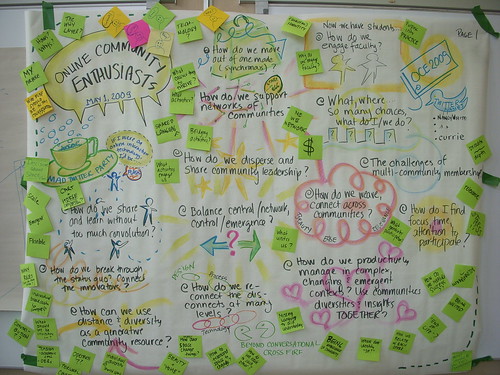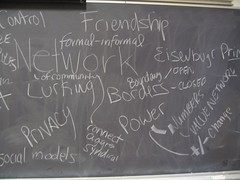
 photo credit: os♥to
photo credit: os♥to
I hate titling these blog posts with the words “community management.” After writing post 1 and post 2 on this topic (triggered by Chris Brogan), the words just feel wrong. But because this is the label that has been floating across our blog conversations, I’m keeping it in as “connective tissue.” I was actually thinking about “The Giant Ear!”
So why am I writing a third post in three days on community management? (Instead of going for a walk this morning. Uh oh.) It is “in the air.” For those who have had a baby, it’s like once you get pregnant, all of a sudden you notice all the other pregnant women walking around town! Once you start putting blogging your ideas on something, you notice others who have thought/said/tickled around the same thing. The waves of blogging conversations about community management seem to be washing on the shore closer together these days.
While catching up on some feeds, I saw Matt Moore’s bit on
chief conversation officer.
Organisations need Social Media Relations people. And because of the participatory nature of the social media, these people will have to blog. And comment on other blogs. And Twitter. And all that other stuff. They will encourage, advise and look out for bloggers and social media headz in their own organisations. And they will have to believe in what their organisations do (be it curing cancer or causing it) or else they will get found out.
Everyone wants to be Chief Talking Officer. Who wants to be Chief Conversation Officer?
Hm. Matt is talking about something different than this animal we’ve been calling community manager, but some of the functions he lists hearken back to Chris’s list. But do you feel the dissonance that I do? Just the title “officer” shows us the polarities that we activate when trying to reconcile a network activity with a corporate structure.
Control <–> Emergence
Talking <–> Listening
Planned <–> Evolving
Being in charge <–> Being able to be an effective network actor
We are recognizing these polarities or tensions. (YAY!) They are showing up in thousands of blog posts and creeping into books. They emerge from deep roots and cannot be ignored or wished away. Yet it seems to be hard to talk about them within organizations and even the “job descriptions” we see more of every day. (Check the listing of online community manager blogs on Forum One’s site or on Jake McKee’s.)
Let’s make them discussable, and we can discover the way forward. Let’s discuss them — with every boss and leader who will listen. Let’s encourage the network around organizations to tell them how they feel about being managed – or listened to. Let’s find a way to use the power of the network for our organizations, and with it, the multiplied, nested power of the communities that live in and spring from the network. (Oh heck, I’m getting all riled up and haven’t even had a cup of tea this morning!)
To circle back to this idea of “community manager,” and what it is becoming in a network age, the first thing is to be brave enough discuss the idea that it may be “management” in the frame of business structures and some “older ways” of doing things, but in terms of the action in the network, it is not management as we know it. It is is about being connective tissue between an organization and the world/network it lives within. It is about activation, listening, pattern seeking and then bringing that back into the current context of the organization – at whatever stage that organization is in becoming a network organization. It is about reconciling that businesses, in their interaction with the world (customer, vendors, regulators) have opened the door to a new way of being in the system that requires more than management. More than measurable data. More than targets and goals. It requires intuition, intellect and heart.
Heart? Community Managers and HEART she says? INTUITION???
Yes. Heart and intuition, but not in the absence of intellect. Because systems include that beautiful, irrational, impulsive part of human life – emotion. “Community” and “network” both imply human beings. The person you entrust to guide and represent and help your organization learn – this person we have been calling the “community manager” – is your person who stewards your connection to both hearts and minds. Who listens with every available channel, including intuition. How do you measure your ROI on intuition? On heart? I’d ask, what are you losing every day by ignoring them.
So what would you call that role? Magician? The Giant Ear? Elder? I’m currently stumped.
(edited later for a silly typo)
 Having been in the “online community” world since around 1997, I have seen “community” ebb and flow. What is different this time around is the credibility that is given to those talented individuals who help steward, facilitate, care, lead, host, cajole and even “manage” online communities. While we can quibble for hours about the definition of online community (and what is or isn’t a community), the role of supporting these things finally has arrived with legitimacy. (That means people sometimes actually get PAID to do the work! Amazing!)
Having been in the “online community” world since around 1997, I have seen “community” ebb and flow. What is different this time around is the credibility that is given to those talented individuals who help steward, facilitate, care, lead, host, cajole and even “manage” online communities. While we can quibble for hours about the definition of online community (and what is or isn’t a community), the role of supporting these things finally has arrived with legitimacy. (That means people sometimes actually get PAID to do the work! Amazing!)

